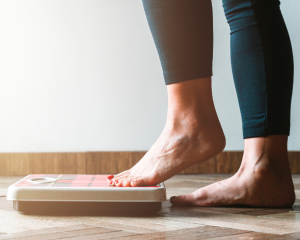What are the stages of the Menopause Journey?
The Perimenopause:
‘Perimenopause’ can be one of the trickiest times in a woman’s life. Typically, women start to experience it in their 40s – and often the most obvious signs are that your periods go a little crazy – though for some it can even start in their 30s.
Think of this stage as the menopause transition. It can take eight to ten years! For some women, this stage can last a few months, yet for others, it can continue for years.
The way some people talk about the perimenopause, you’d think it was a disease. There’s no need to go to your doctor to get an official diagnosis – although it’s worth booking an appointment, if you notice any specific symptoms, as they can point to other problems and it’s always better to be safe than sorry.
The Menopause:
The menopause actually refers to a time when you haven’t had a single period for at least a year. The ovaries no longer produce eggs, and your oestrogen levels and progesterone production are significantly reduced. Symptoms may still continue in this phase but will slowly reduce in frequency and severity.
Post Menopause:
This is the phase after the menopause where all the symptoms have subsided.

Common client questions
Why am I so exhausted? If you are really struggling with your energy levels, it’s also worth getting your thyroid checked, if it hasn’t already been because perimenopausal and menopausal women are at greater risk of thyroid dysfunction. Added to this, thyroid symptoms can mimic menopausal symptoms. The ovaries, uterus, adrenal glands and the brain require adequate thyroid hormones to function.
Why am I suffering with low mood and anxiety?
Low mood and anxiety are very common symptoms for many women throughout menopause. However, this might not just be down to menopause. It’s always worthwhile getting vitamin D, B12 and folate levels checked as these can all contribute towards low mood.
Don’t assume it’s all related to hormones. Entering this new stage in life can be daunting, and sometimes it’s not all about nutrition. Find new ways to energise yourself, perhaps finding a hobby that motivates you, even if that’s simply taking a stroll outside, or listening to music.
I am struggling with my weight, since I hit my 40’s, what can I do?
Because oestrogen regulates fat and glucose metabolism, once we are in peri-menopause phase, this can lead to changes in our metabolism, and ultimately in weight gain. This can also be driven by sleep disruptions, digestive symptoms, and stress, which are often experienced.
Stress can greatly impact the ability to lose weight by stimulating blood glucose and encouraging fat storage. However, it is possible to lose weight during menopause journey by improving dietary and lifestyle choices as follows:

Balance your blood sugars
Check your blood glucose levels. If your blood glucose levels are too high, this will be inhibiting weight loss, which as mentioned above, can often be linked with stress and a lack of sleep. Learning how to balance blood sugars is really important for weight loss.
Eat three meals a day at regular intervals.
Eat a palm-sized portion of protein at each meal (meat and poultry, fish and seafood, tofu, eggs, beans, lentils, chickpeas, nuts and seeds – ideally nothing in batter or breadcrumbs).
Fibre
Increase your intake of prebiotic fibre from fresh fruit and vegetables, or through prebiotic supplementation. Prebiotic fibre, such as inulin in chicory root and resistant starch in cooked cooled potatoes, promote satiety and fullness, reduce cravings, and promote weight loss.
Eat Good FatsDon’t worry about healthy fats, like olive oil and avocados (the calories in vs calories out myth has been debunked now for a while).
Eat a RainbowEat a minimum of five portions (three heaped tablespoons) of non-starchy vegetables / salad per day. Always have vegetables / salad with lunch and dinner, breakfast, too, if you wish. There is no upper limit on how many vegetables you can eat. The ideal options are anything that grows above ground. Eat two portions of low glycaemic fruit per day, with meals – bananas are high in sugar, however handy they are to transport so try to stick to berries of any kind, apples, pears, plums, tangerines or similar, lemon and lime, peaches and nectarines.
Reduce SnackingIdeally you should feel satisfied from your main meals and not require snacks though the day, however, should you feel hungry or if you are working out, you can have one snack per day – something like oatcakes with cream cheese, hummus, cottage cheese, ham and tomato, a small pot of natural yoghurt with berries, a Bounce ball, a handful of nuts and/or seeds, a matchbox-sized chunk of cheese with an apple, cut up apple and unsweetened nut butter.
Manage your Stress better
Reduce your stress by incorporating daily relaxation techniques such as breathing exercises, gentle stretching and meditation. Use calming nutrients: chamomile, lemon balm, magnesium, and vitamin B6. They all help to reduce stress by promoting our calming neurotransmitter – GABA in addition to promoting better sleep.
SleepYou would be amazed the difference a really good sleep can have on symptoms as it helps managing stress levels. On both counts, Epsom salt baths deliver amazing results. You’ll also want to put in place a proper sleep plan that limits screen time at least one hour before bed, has some wind-down time, involves a dark room (or eye mask) … I know you understand that on an intellectual level. But are you actually doing anything about it? This is already a lot for you to think about, so I will leave you with this. Choose to work on ONE thing only this week. It doesn’t really matter what it is. Don’t take on too much at once. Get really good at getting an early night, winding down with a book and enjoying the benefit of good sleep. Or focus on getting in more veg into your diet. Or eating a good breakfast using the guidelines above.
What will you choose this week to make a positive change?

How can a Nutritional Therapist help me with the Menopause?
Whatever your specific symptoms are, a tailored nutrition plan can really help. I know you could search the internet for ‘diets for the menopause’, ‘things that will help the menopause’ etc but the truth is, – and I know this from working with many clients dealing with symptoms– the answer lies not in fixing yourself symptom by symptom. In the human body everything is connected in ways you might not imagine. Looking at the whole of you rather than individual complaints is the way forward. I work with women who are done with dealing with feeling a shadow of the person they used to know and love.

What you need to know about testing vitamin D
Did you know, that during the winter, however much the sun shines, you are simply not going to absorb any vitamin D. So it’s really

Everything you need to know about my transformational weight loss programme
Transformational weight loss programme – 12 weeks You can’t just embark on a new diet plan without also taking care of your relationship with food,

What does ‘gut health’ actually mean?
Did you know that 90% of disease can be linked back to gut health? Over the years I have seen numerous clients for all different

Once you pop, you can’t stop – why Pringles are so addictive
Why is it? Once you pop, you can’t stop! Remember this advertising slogan? Can you relate to it? Why is it when we start to

How can I manage a metabolic condition?
How can I manage, and improve my metabolic condition? Whether you have had an official diagnosis or not, you could be on your way to

What is metabolic syndrome and how can it be treated
What is Metabolic Syndrome? Metabolic syndrome is a combination of metabolic dysfunctions in the body which can be; obesity, fat around the middle, type 2



